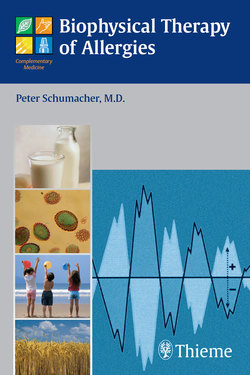Читать книгу Biophysical Therapy of Allergies - Peter Schumacher - Страница 10
На сайте Литреса книга снята с продажи.
Оглавление4 Symptoms of Allergic Reactions
Allergic reactions can manifest in so many ways throughout the body that we need to consider an allergy when looking at almost every medical symptom!
The most common symptoms are listed in the table below:
Most Common Symptoms of Allergic Reactions
General symptoms:
Fatigue, decreased performance, feeling cold, vertigo
Cutaneous symptoms:
Exanthema (maculate, popular, urticarial, etc.)
Quincke's edema, itching, neurodermatitis—all severities
Irritation of the mucous membrane:
Rhinitis, sneeze impulse, conjunctivitis, itchy eyes, cough, bronchial asthma
Gastrointestinal symptoms:
Feeling of repletion, gastritis, stomatitis, diarrhea, meteorism, Roemheld's syndrome, colitis in various forms
Heart and circulatory symptoms:
Variations in blood pressure, syncope, tachycardia, extrasystole
Bladder symptoms:
Polyuria, dysuria, irritable bladder, susceptibility to urinary tract infections
Muscles, joints:
Sore muscles, rheumatic pain
Psychological symptoms:
Depression, restlessness, confusion, feeling dazed, anxiety and panic attacks, aggressiveness, hyperactivity in children
Headaches and migraines
Weight loss and gain
Anaphylactic shock
The location, intensity, and time of appearance of allergic symptoms depend on various factors:
Allergy symptomatology depends on:
Genetic factors.
Type and quantity of antigens.
Patient's level of sensitization.
Organism's current state of health.
Usually the prerequisite is a genetic predisposition. The ability to create an allergy is inherited, not the type of allergy or the substance that causes it.
The allergen potency of a trigger substance varies. Aggressive allergens are substances that easily cause sensitivities (e. g., grass pollen, cat hair, strawberries). Therefore the clinical symptomatology caused by these substances occurs frequently.
Allergic reactions vary depending on the general state of the organism.
Any somatic stress (other illnesses, focal infections, toxic or geopathic stressors) can intensify a reaction.
Particularly important is any kind of psychological stress. Fear, grief, excitement, being overtaxed at work or school, etc. can cause the onset of or intensify allergic symptoms. On the contrary, these symptoms may improve considerably or disappear completely in a relaxed, harmonious situation.
Most people with allergies have particular “target organs” that tend to manifest allergic reactions (specifically skin, bronchials, intestinal mucosa).
